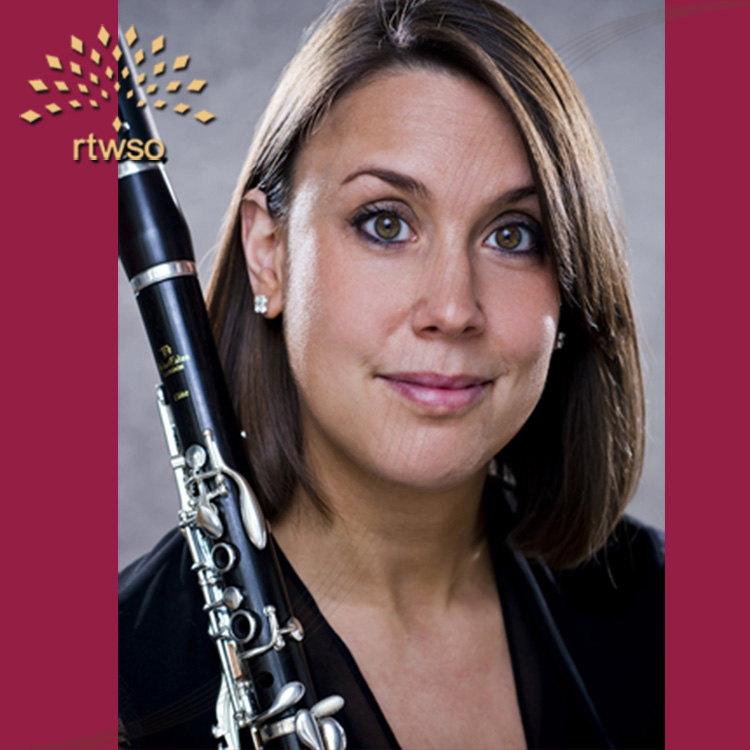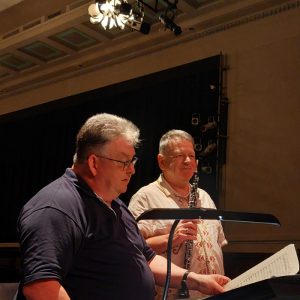One dictionary’s definition of ‘Passion’ is “ … a strong liking or desire for, or devotion to, a person, an object, some activity or concept”. In its March concert the RTWSO, under its Music Director & Principal Conductor, Roderick Dunk, exploited the full gamut of passions as defined above.
The concert opened not, in what some might consider a traditional way, with a rousing overture, but with the gentle flowing melodies depicting the tragic love story of Pelléas and Mélisande as realised in the music of Gabriel Fauré’s Suite of the same name. The story revolves around the love that two brothers, Golaud and Pelléas have for Mélisande. Golaud marries Mélisande but she and Pelléas have an affair. The music conveys love, desire, happiness, jealousy and ultimately, tragedy, when Golaud kills his brother and Mélisande dies in childbirth. Empathetic playing in the orchestra’s strings and woodwind sections matched the story’s heart-rending twists and turns.
A passion for the clarinet underpinned the concerto heard next in this concert. Aaron Copland’s Clarinet Concerto was commissioned in 1947 by the legendary jazz clarinettist Benny Goodman. Making a welcome return to the Assembly Hall, after playing Malcolm Arnold’s Clarinet Concerto No. 2 with the RTWSO in March 2019, Katherine Lacy proved what a fine modern-day exponent she is on this instrument. Looking at her impressive CV in the Programme it seems incredible that Katherine has achieved so much already. With its jazz influences and non-classical techniques, the soloist has to ‘feel’ the soul in the Copland concerto. Being equally at home with the classical and modern repertoire, Katherine showed how she could transition seamlessly from the slow lyrical opening of this concerto into the much faster jazz-infused section. In addition to the clarinet and strings, the work includes a piano and harp which Copland used to help create unusual percussive effects.
After the interval came two compositions by Jean Sibelius – the Karelia Suite and Symphony No. 7. Both contain much evidence of patriotic fervour. In similar but different circumstances from what is currently happening in Ukraine, Sibelius composed these pieces at a time when Finland was under Russian domination and oppression. He had strong feelings about the Karelia region – he even spent his honeymoon there – so when events became challenging, he set about composing a piece full of nationalistic references to help bolster morale. The central movement, the soulful Ballade which is based upon a Karelian folk melody, fades away with an exquisite cor anglais solo, which was beautifully played by Anne Glover.
Symphony No. 7 was Sibelius’s final symphony and quite unlike his previous six. Symphonic form fascinated Sibelius and by the time he wrote this work – unusually cast as a continuous, single movement – his passion for the particular genre had taken him away from the epic, but much more traditionally-structured early symphonies, to this very original composition. Sibelius, like Sir Winston Churchill, often made memorable quotes! One of them was “The framework of a symphony must be so strong that it forces you to follow it, regardless of the environment and circumstances.”
Although Sibelius was a violinist – he had early dreams of being a concert performer – this symphony makes much use of the brass instruments and the RTWSO’s brass section had a good work-out! So much so that a fifth horn – a bumper – was used to help spare the embouchure of first horn, Dave Lee. A solo trombone also featured several times – how nice to see a trombonist being “Full of acknowledged by the conductor at the end of the performance!
All in all a ‘passionate’ afternoon, let’s hope we recover ahead of the RTWSO’s final concert of this season on 2 April.



